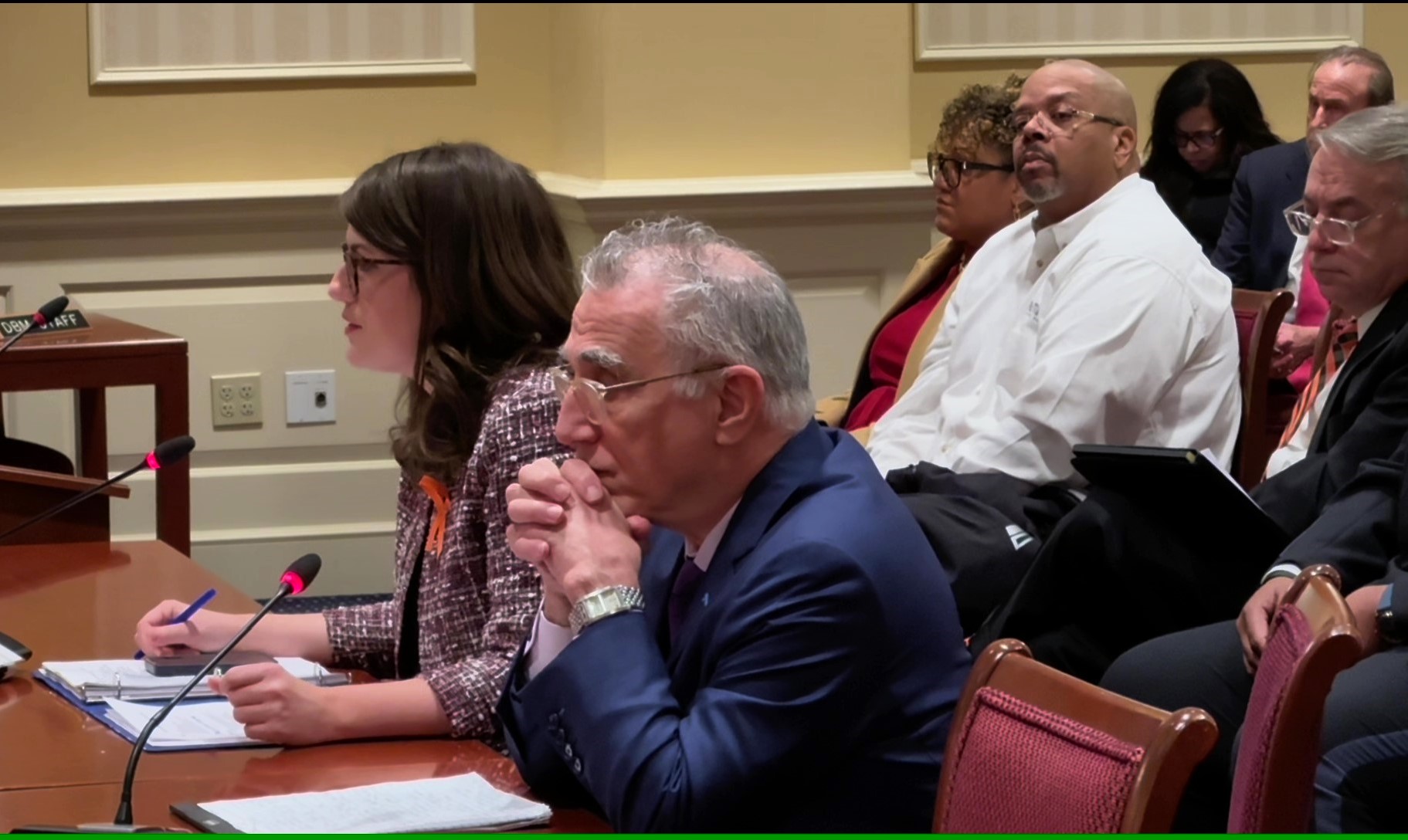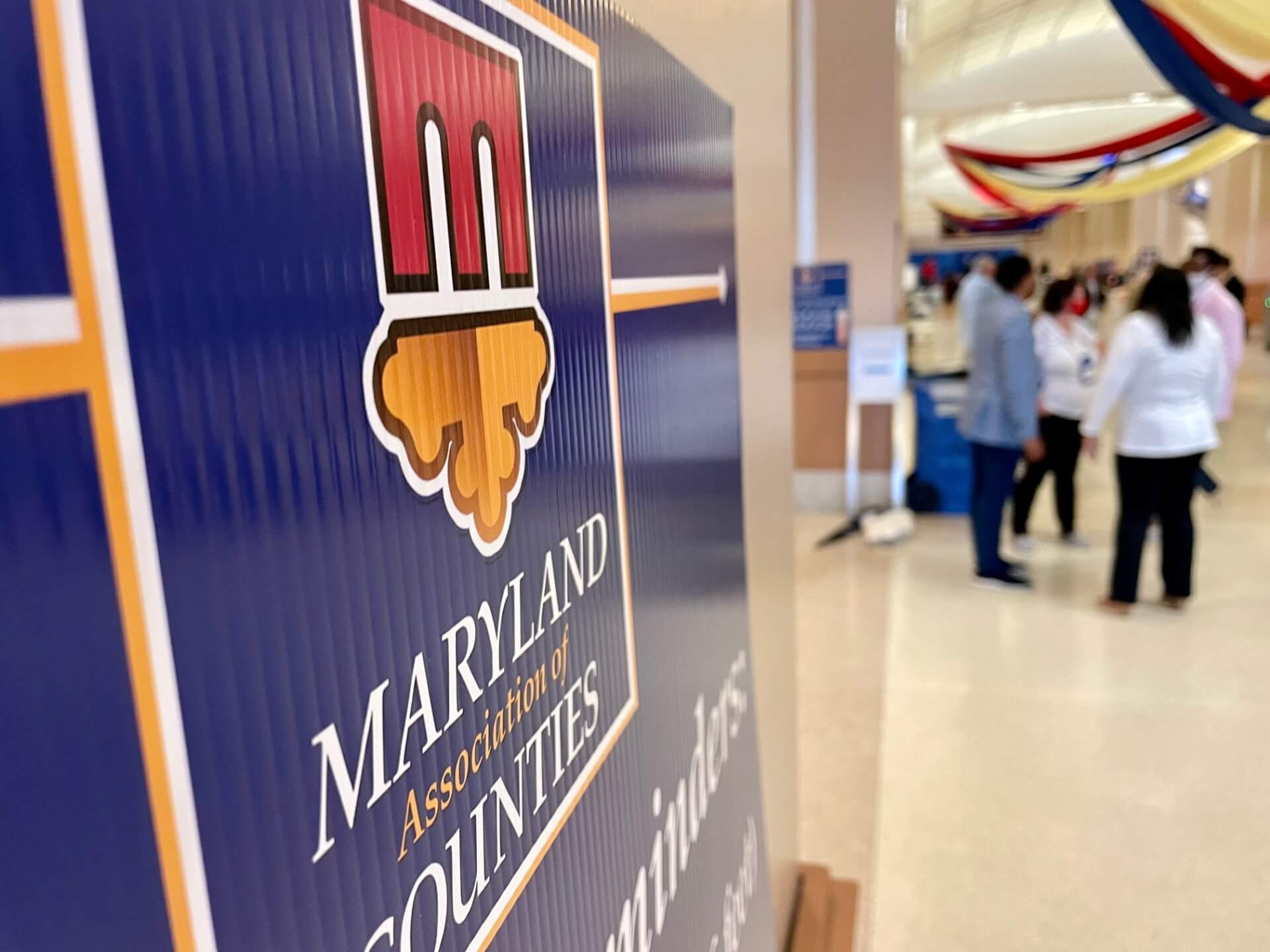Postcard from MACo: Donald Trump, Uninvited Guest
Gov. Larry Hogan (R) will walk the Ocean City boardwalk on Friday, and he’s sure to receive a hero’s welcome: Hogan, after all, expended significant political capital last year to delay the beginning of the Maryland school year in the name of boosting the state’s tourist economy.
Hogan was also warmly received Thursday as he meandered through the cavernous exhibition hall at the Maryland Association of Counties summer convention in Ocean City. By all appearances, Hogan should still be a strong favorite for re-election next year.
But Hogan may have an unseen and unwanted weight on his shoulders as he soaks up the rock star treatment on the boardwalk: President Trump.
With Trump appearing more unhinged and isolated than ever this week, the electoral terrain for all Republicans in 2018 – even popular ones like Hogan – could be slippery.
Hogan’s decision this week to support the removal from the State House grounds of the statue of former Supreme Court Chief Justice Roger Taney, the author of the 1857 Dred Scott decision equating slaves with property, came in the wake of Trump’s controversial and confusing responses to the white supremacist rally Saturday in Charlottesville, Va., which left one counter-protester and two state troopers dead. And it illustrated once again just how complicated any Trump connection can be for the governor.
Hogan this week was quick to criticize Trump, saying Wednesday that the president’s response to the Charlottesville crisis was “a terrible mistake.” But Democrats seized on the fact that Hogan two years earlier said any decision to remove the Taney statue would be capitulating to political correctness.
One Democratic candidate for governor, state Sen. Rich Madaleno, released a video on Thursday comparing Trump’s and Hogan’s views on the issue. And even some Republicans, publicly or privately, questioned the wisdom of the decision; some noted that it isn’t likely to win Hogan any new votes.
“I don’t get this,” Greg Kline, a pundit and podcast host on the influential Red Maryland website wrote this week in perhaps the most pointed public GOP criticism. “I was so proud of the 2015 Governor Hogan who was the ardent defender of our state’s history, good and bad, and who showed real leadership against the cultural Marxism that is now truly running amok. Now, I cannot honestly trust that the Governor will defend any of it and could not sincerely be able to argue he has not completely capitulated on the entire issue.
“Maybe it is smart politically. Maybe it is ruthlessly pragmatic and the price to be paid for the great positives of having this Governor. Time will tell but I fear the cost will be great also.”
One Hogan adviser said the decision was the only practical one for the governor to make, because it took an issue away from the Democrats, who otherwise would not let it go. And, as some Republicans and Democrats have noted, state Senate President Mike Miller (D), an old-school moderate Democrat, has criticized Hogan for quickly deciding he wants the Taney statue removed.
But it brings home once again how Trump may complicate the political fortunes of Hogan and other Republicans looking to prosper in nominally blue Maryland.
Throughout Ocean City on Thursday, where many of the state’s political leaders were gathered for the MACo convention, the subject of the Trump effect was a hot topic of conversation.
National media reports suggest Trump is becoming ever more estranged from Republican leaders on Capitol Hill, who have condemned the white supremacist and neo-Nazi groups that gathered in Charlottesville but, with a few exceptions, have yet to criticize Trump directly.
Will this attempt to distance themselves from Trump protect potentially vulnerable congressional Republicans in 2018 – especially when Trump’s political brand is in many ways separate and distinct from the GOP’s? And what about Republicans running for state and local offices in Maryland, from Hogan on down?
“By 2018, people will be looking at the record of their leaders at the local and state level in the context of how they fought for our values and how they fought for the things that matter,” said Howard County Councilmember Calvin Ball (D), who ticked off issues like health care, education and immigration, where Trump’s views appear to be at odds with a majority of Maryland voters.
“Did they stand up and speak out against injustices, or were they complacent and complicit?”
For Ball, that’s an especially pointed question, as he gears up to challenge Howard County Executive Allan Kittleman (R) – who like Hogan is a popular, well-funded incumbent whose ideology isn’t nearly as rigidly conservative as the national GOP.
Howard County is considered one of the state’s bellwethers, even though registered Democrats outnumber Republicans by almost 2-1. By Ball’s calculations, he needs a robust Democratic turnout to defeat Kittleman; the incumbent will depend on support from some Democrats and nonaffiliated voters, but can’t afford to lose too many Republicans and thus may be reluctant to criticize Trump too vocally.
Many Maryland Republicans said Thursday that their relentless focus on state and local issues will help inoculate them from any national anti-GOP surge that Trump might generate.
“I think there may be a small [Trump effect], but all politics is local,” said state Senate Minority Leader J.B. Jennings (R). “And when you get down to these races, the voters are going to look at the legislators – do they respond to them? How do they represent them? Same with the governor.”
Liz Matory, a member of the Montgomery County Republican Central Committee who switched parties a year after losing a 2014 Democratic primary for a House of Delegates seat, said voters are smart enough to separate state and local races from federal politics.
“Look at Montgomery County and term limits,” she said, pointing to the 2016 election, when almost 70 percent of voters supported limiting the service of the county executive and County Council members. “They wanted to vote for their girl Hillary [Clinton, in the presidential race], but they also voted for change at the local level.”
Rep. Dutch Ruppersberger (D) agreed that “everything in the end is local,” but said Trump’s rhetoric and positions have become so toxic that there inevitably will be peril for Republicans.
“I think Trump is causing a lot of anxiety for Republicans and if they don’t start standing up soon it’s going to affect them nationally,” Ruppersberger said. He added that in Maryland, the major Democratic vote is in the Washington, D.C., suburbs, where anti-Trump sentiment appears to be the strongest.
Ruppersberger conceded that Hogan is popular and looks tough to beat, but argued that former Gov. Bob Ehrlich (R) was also quite popular before being swamped by a national anti-GOP wave – and then-Baltimore Mayor Martin O’Malley (D) – in 2006.
Hogan’s strongest Democratic ally, state Comptroller Peter Franchot (D), said that Trump’s behavior has been damaging to the state economy and predicted that Democrats will benefit electorally in 2018.
“I’m optimistic on the Democrats,” he said.
But Paul Ellington, a longtime Maryland GOP strategist, said Hogan seems uniquely equipped to survive any anti-Trump surge, because he is so in sync with voters.
“He doesn’t shoot from the hip,” Ellington said. “He does everything from his head and his heart, and he knows exactly where Maryland voters stand.”




 Creative Commons Attribution
Creative Commons Attribution